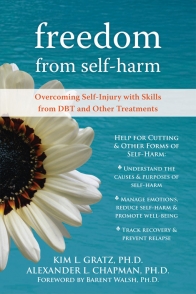 by Alexander L. Chapman PhD, RPsych, Kim L. Gratz PhD, Barent Walsh PhD
by Alexander L. Chapman PhD, RPsych, Kim L. Gratz PhD, Barent Walsh PhD
Self-injury can be as addictive as any drug, and the secrecy and shame many sufferers feel about this behavior can keep them feeling trapped. But if you're ready to replace self-harm with a set of healthy coping skills, this compassionate and practical book can help.
Full Description:
Self-injury can be as addictive as any drug, and the secrecy and shame many sufferers feel about this behavior can keep them feeling trapped. But if you're ready to replace self-harm with a set of healthy coping skills, this compassionate and practical book can help.
This complete guide to stopping self-injury gives you the facts about self-harm, corrects common myths about this behavior, and provides self-soothing techniques you can begin using right away for regulating difficult or overwhelming emotions. Freedom from Self-Harm also includes self-assessment worksheets, guidance for seeking professional help, and information about the most effective therapies and medications. Drawn from treatments such as dialectical behavior therapy and acceptance and commitment therapy, the tools in this book can help you cope with your emotions whenever you feel the urge to self-harm.
This book has been awarded The Association for Behavioral and Cognitive Therapies Self-Help Seal of Merit — an award bestowed on outstanding self-help books that are consistent with cognitive behavioral therapy (CBT) principles and that incorporate scientifically tested strategies for overcoming mental health difficulties. Used alone or in conjunction with therapy, our books offer powerful tools readers can use to jump-start changes in their lives.
“Finally, adolescents and adults who self-harm have a clear and comprehensive guide that explains in layperson’s terms the etiology and maintenance of these challenging behaviors. This guide is useful for individuals struggling with how to reduce their self-harm as well as family members who need help learning how to respond effectively.”
—Alec L. Miller, Psy.D., professor of clinical psychiatry and behavioral sciences at Albert Einstein College of Medicine
Pages: 280, softcover
|